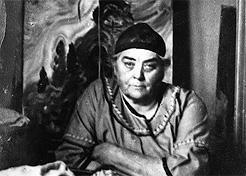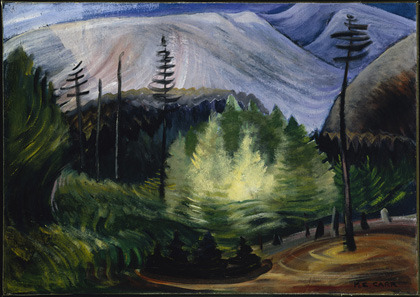More Emily Carr
Emily Carr, "New Growth," c. 1936
I am always asking myself the question, What is it you are struggling for? What is that vital thing the woods contain, possess, that you want? Why do you go back and back to the woods unsatisfied, longing to express something that is there and not able to find it? This I know, I shall not find it until it comes out of my inner self, until the God quality in me is in tune with the God in it. Only by right living and a right attitude towards my fellow man, only by intense striving to get in touch, in tune with, the Infinite, shall I find that deep thing hidden there, and that will not be until my vision is clear enough to see, until I have learned and fully realize my relationship to the Infinite...
Search for the reality of each object, that is, its real and only beauty; recognize our relationship with all life; say to every animate and inanimate thing "brother;" be at one with all things, finding the divine in all; when one can do this, maybe then one can paint. In the meantime one must go steadily on with open mind, courageously alert, waiting always for a lead, constantly watching, constantly praying, meditating much and not worrying...
 Then she quotes Whitman's Song of the Rolling Earth:
Then she quotes Whitman's Song of the Rolling Earth:
"Say on, sayers! sing on, singers!
Delve! mould! pile the world of the earth!
Work on, age after age, nothing is to be lost,
It may have to wait long, but it will certainly come in use,
When the materials are all prepared and ready, the architects shall appear."
And concludes:
So -- no matter if we are not to make the goal ourselves. All our work helps us to accumulate material for the great final structure. Our business is to do our own small part with absolutely no thought of personal aggrandisement or glory.
Emily Carr, Hundreds and Thousands, the Journals of Emily Carr
Such sentiments sound so old-fashioned in our cynical and materialistic age. There's the language itself, but more so the idealistic selflessness, the notion that we would actually do something difficult, strive hard over an entire lifetime, not for ourselves, but because we have faith that it will all mean something in the end: that this human project is actually has a greater goal and we each have our part in it. I wonder how many people (other than dedicated parents, who do think this way still) even entertain thoughts like this today, let alone base their lives on them -- but this sense of the nobility of human endeavor used to be widespread. I don't think you have to be traditionally religious to have this sense of purpose and meaning; but you do need to have read, looked deeply at the arts, thought about "creation" in a very broad sense, and felt the desire to try to do something yourself as well as you possibly can, to swim in that stream of human endeavor, inspired by something besides dreams of personal grandeur.




